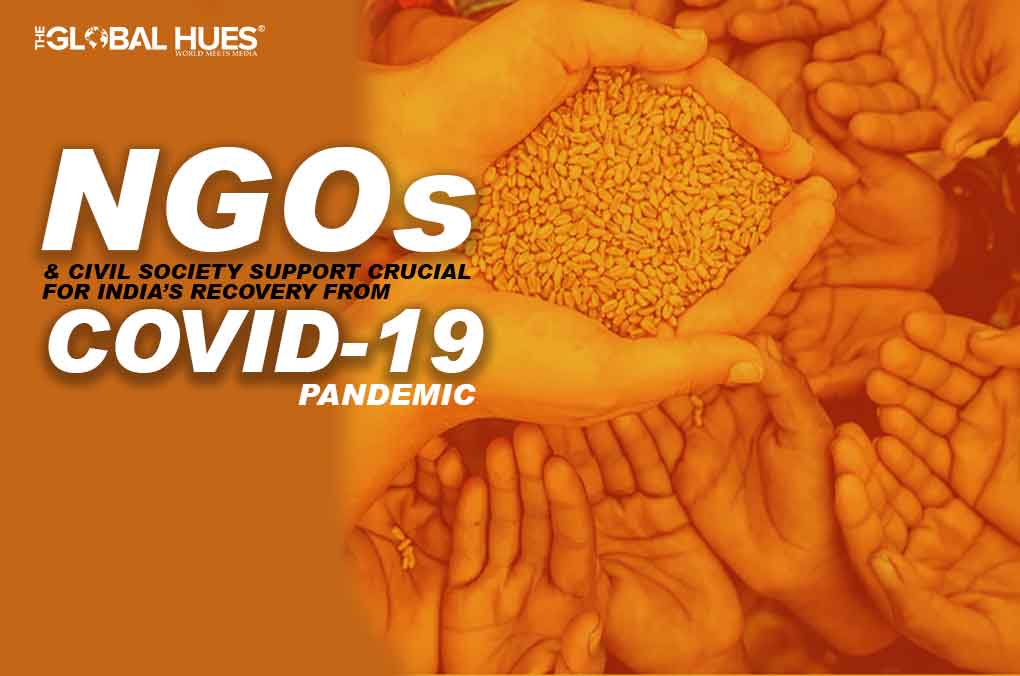By Amitabh Behar (CEO of Oxfam India)
The COVID-19 pandemic has been devastating lives, livelihoods, and essential services since last two years. The government, development agencies, private sector and civil society organisations are working on rapid recovery, but major gaps remain in terms of pandemic preparedness, health infrastructure and learning loss.
India’s civil society and NGOs started responding to the COVID-19 pandemic even before the lockdown began. For example – Oxfam India’s humanitarian planned a response which spanned across 16 states of India. Till now, Oxfam India’s Mission Sanjeevani has provided unconditional cash transfers to more than 12 thousand households amounting to more than INR 5.44 Cr.
Mission Sanjeevani has provided lifesaving medical and diagnostic equipment to 150 District Hospitals, 172 Primary Health Centres, and 166 Community Health Centres in 16 states. Seven oxygen plants have been set up and made operational across the country, the latest being at Kushinagar in Uttar Pradesh.
The Supreme Court of India has acknowledged the crucial role played by civil society and NGOs in June 2020. “Non-governmental organisations coming forward to help the migrant workers and to fight the pandemic and extend help by providing food, water and transportation at their cost deserves all appreciation,” the court said.
Oxfam India was one of the few organisations to set up relief camps during the migrant worker crisis. As the pandemic progressed, the organisation worked with front line healthcare workers to increase their capacity to fight the virus. Considering the immediate need to ramp up the oxygen infrastructure in the country, Oxfam India started building oxygen plants in various states for government hospitals.
Two years into the pandemic, civil society in India continues to work with district administrations to provide crucial supplies despite multiple challenges on funding and regulatory fronts. Oxfam India has been on the ground since day one of the world’s largest COVID-19 lockdown providing relief to communities in need through rations, life-saving equipment, strengthening of the public healthcare system and measures to bridge the learning gap among children.
Mission Sanjeevani continues to provide a helping hand to some of the most vulnerable communities as the pandemic raged across the country. These consisted of migrant fisherfolk community (Gujarat), transpersons (Kolkata), homeless (Delhi), tea garden workers (Assam), Cyclone-affected families (Sunderbans in West Bengal and Odisha), sugarcane workers (Maharashtra), artisans such as weavers (Assam) and dholak makers (UP), household help (Delhi), Pak Hindu refugees (Delhi), PVTGs (Chhattisgarh), Cancer patients (Delhi), migrant workers (Bihar) and daily wage workers.
Oxfam India also started COVICALL Centre for those who were unable to use social media for help. During the second wave, the crumbling healthcare system left everyone scrambling for information. Those who had the access to the internet and social media and WhatsApp could send out requests and appeals for oxygen cylinders, ventilators, hospital beds etc. But there were many who did not have access to social media. In order to bridge this digital divide, it decided to set up a covicall centre— SANJEEVANI. The call centre handled queries in Hindi, English, Odia, Bangla, Marathi and Kannada.
Till February 2022, Mission Sanjeevani has provided unconditional cash transfers to more than 12 thousand households amounting to more than INR 5.44 Cr. Besides Mission Sanjeevani, Oxfam India has 15 other significant projects where our extensive work helps more than 1.5 million people comprising mainly Dalits, Adivasis, minorities and women and girls in 9 states, 25 districts and approximately 300 villages.
Through Mission Sanjeevani, Oxfam India is also helping ASHA workers who are at the frontline helping people during the pandemic. The ASHA intervention program is providing essential safety and protective kits and materials along with training to enhance their capacity. Oxfam India has so far reached out to more than 60,000 ASHAs across 12 states. Some of the items on these safety kits are thermal guns with batteries, pulse oximeter, 5 sets of nasal masks, 100 surgical masks, 2 sets of reusable gloves and 20 sets of disposable gloves.
Civil society and NGOs like Oxfam India continue to serve the vulnerable as India aims for rapid COVID-19 recovery. According to the latest report by the Reserve Bank of India (RBI), the country’s economy will take as long as 12 years to recover losses from the COVID-19 pandemic. This period should be used to build back a better and more inclusive economy.




